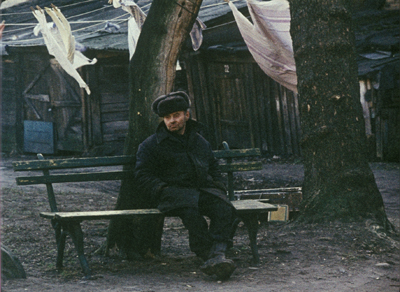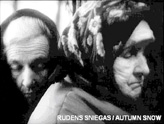Vilnius Documentary Film Festival: The turning-point generation has forcefully declared its attitude towards cinema and reality

Skalvija Cinema Centre has been organising the 6th edition of the International Vilnius Documentary Film Festival that will take place from October 9 to 18 at the Skalvija Cinema Centre. This year the VDFF will present a special programme: “The Turning-Point Generation in Lithuanian Documentary Cinema (1989 – 1994)”. It will feature debut films by the generation of filmmakers who came to Lithuanian cinema in the 1980s: Šarūnas Bartas, Arūnas Matelis, Audrius Stonys, Algimantas Maceina and Artūras Jevdokimovas.
Documentary Film Festival that will take place from October 9 to 18 at the Skalvija Cinema Centre. This year the VDFF will present a special programme: “The Turning-Point Generation in Lithuanian Documentary Cinema (1989 – 1994)”. It will feature debut films by the generation of filmmakers who came to Lithuanian cinema in the 1980s: Šarūnas Bartas, Arūnas Matelis, Audrius Stonys, Algimantas Maceina and Artūras Jevdokimovas.
The programme will be presented by the film critic Živilė Pipinytė:
-- In the 1990s, a new generation of filmmakers came to Lithuanian cinema. Straight away they declared their attitude towards cinema and reality clearly and forcefully. The years 1985 – 1989 were dramatic turning-point years in Lithuanian cinema when the entire Soviet system of financing, production and distribution of films collapsed. Censorship, until then inseparable from the film industry, collapsed soon, too. The older generation of filmmakers tried to take the opportunity to speak about issues that had been forbidden before: post-war resistance and deportations; they wanted to honour public and cultural figures pushed to obscurity. Most often such films could not avoid a declarative tone. I do not know whether films created by young filmmakers were their reaction to documentary films by their older colleagues: the latter conveyed the spirit of independence demonstrations, but were essentially de-personalised, even though using techniques of poetic cinema. Yet young film directors clearly did not want to identify either with the idealised past of inter-war or with the present that was becoming increasingly like a caricature (which came with the freedom of consumption and the spreading mass culture). The resulting films, In Memory of a Day Gone By by Šarūnas Bartas (1990), Ten Minutes before the Flight of Icarus by Arūnas Matelis (1990), Earth of the Blind by Audrius Stonys (1991) or Autumn Snow by Valdas Navasaitis (1992) as well as Illusions by Diana and Kornelijus Matuzevičius (1993), express a desire to speak about existential issues and, first of all, about one’s solitude in the alien world, about the meaning of life and feelings, about the temporariness of being and the clash between patriarchal and new values. A film by Algimantas Maceina, Black Box (1994), which documented the transfer of his grandfather’s remains from Siberia to , is still one of the most original experiments in Lithuanian documentary cinema. The Idylls of Kirtimai by Arturas Jevdokimovas (1991) is one of rare attempts in Lithuanian documentary cinema at anthropological observation. The world of these films is empty, abandoned, crumbling; it is, as if, seen through the eyes of lonely people. At the same time, it shows an inner landscape because people interact with reality comparatively freely, although they are aware of the principles of observation (even on the contrary). The static camera of their films likes to record time; time becomes the subject of films. The early works by now famous and recognised filmmakers expressed the human condition in the face of the great historical transitions quite accurately. These directors do not trust words; thus, there are very few of them or even none in their films. They trust images, however. Images in their films become symbols and metaphors; they reflect not only the external reality, but they are, first of all, a reflection of an inner reality. Consequently, their films are often inner monologues, cinematographic meditations on reality and philosophical narrations about the hidden meaning of the world, about the presence of humans and other creatures on Earth.
Earth of the Blind by Audrius Stonys (1991) or Autumn Snow by Valdas Navasaitis (1992) as well as Illusions by Diana and Kornelijus Matuzevičius (1993), express a desire to speak about existential issues and, first of all, about one’s solitude in the alien world, about the meaning of life and feelings, about the temporariness of being and the clash between patriarchal and new values. A film by Algimantas Maceina, Black Box (1994), which documented the transfer of his grandfather’s remains from Siberia to , is still one of the most original experiments in Lithuanian documentary cinema. The Idylls of Kirtimai by Arturas Jevdokimovas (1991) is one of rare attempts in Lithuanian documentary cinema at anthropological observation. The world of these films is empty, abandoned, crumbling; it is, as if, seen through the eyes of lonely people. At the same time, it shows an inner landscape because people interact with reality comparatively freely, although they are aware of the principles of observation (even on the contrary). The static camera of their films likes to record time; time becomes the subject of films. The early works by now famous and recognised filmmakers expressed the human condition in the face of the great historical transitions quite accurately. These directors do not trust words; thus, there are very few of them or even none in their films. They trust images, however. Images in their films become symbols and metaphors; they reflect not only the external reality, but they are, first of all, a reflection of an inner reality. Consequently, their films are often inner monologues, cinematographic meditations on reality and philosophical narrations about the hidden meaning of the world, about the presence of humans and other creatures on Earth.
Lithuanian directors often see the world through the eyes of their characters: strange and incomprehensible people, disadvantaged by destiny (or gifted: it depends on the point of view), the rejected and the marginal. This is not a hermetic and closed cinema, but in order to  understand and perceive these films, the input of spiritual effort and aesthetic experience is required. The directors’ efforts to balance on the border between documentary and fiction and to experiment with the forms, language and expression of documentary cinema have been noticed: Earth of the Blind by Stonys won the European Film Award (the Felix Award) for the Best European Documentary; films by Matelis, Navasaitis as well as D. and K. Matuzevičius won many awards of famous film festivals.
understand and perceive these films, the input of spiritual effort and aesthetic experience is required. The directors’ efforts to balance on the border between documentary and fiction and to experiment with the forms, language and expression of documentary cinema have been noticed: Earth of the Blind by Stonys won the European Film Award (the Felix Award) for the Best European Documentary; films by Matelis, Navasaitis as well as D. and K. Matuzevičius won many awards of famous film festivals.
The programme “The Turning-Point Generation in Lithuanian Documentary Cinema (1989 – 1994)” will be screened at the Skalvija Cinema Centre and repeated at the National Gallery of Art.
This year the festival has a specially designed website www.vdff.lt, which will provide information on the events, the guests, film presentations, etc.
The photographs feature film stills from In Memory of a Day Gone By, Autumn Snow and Ten Minutes before the Flight of Icarus.